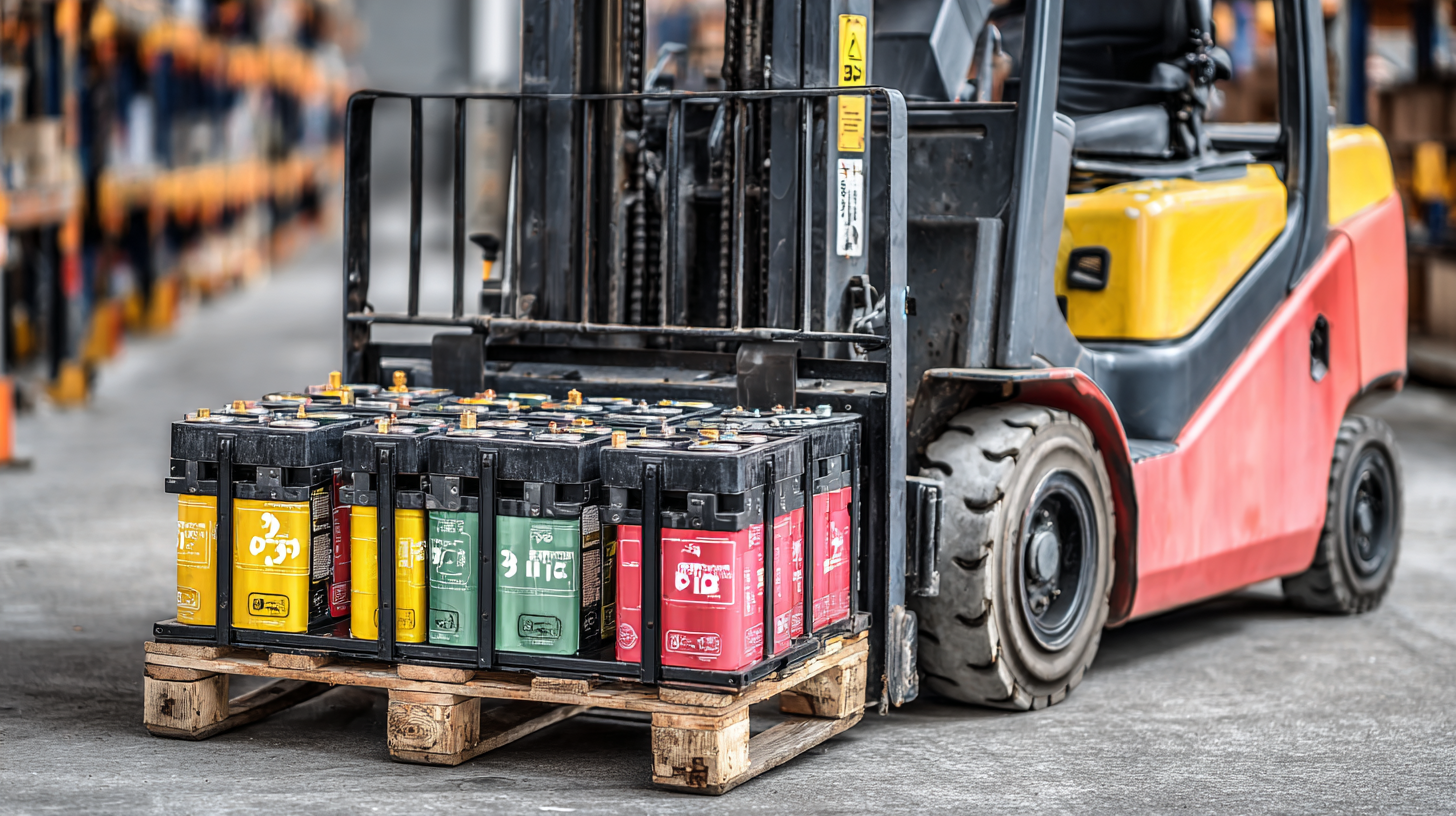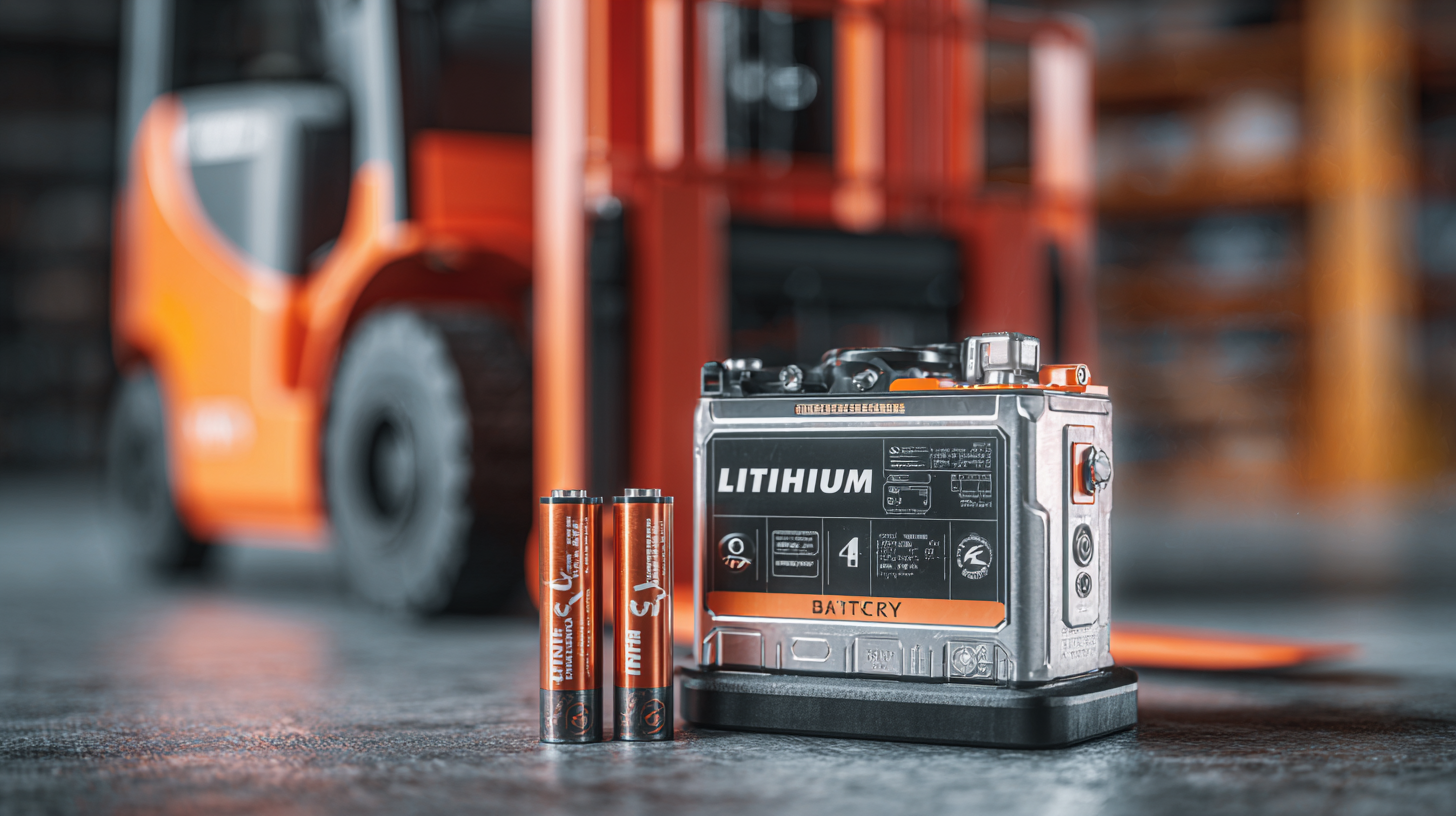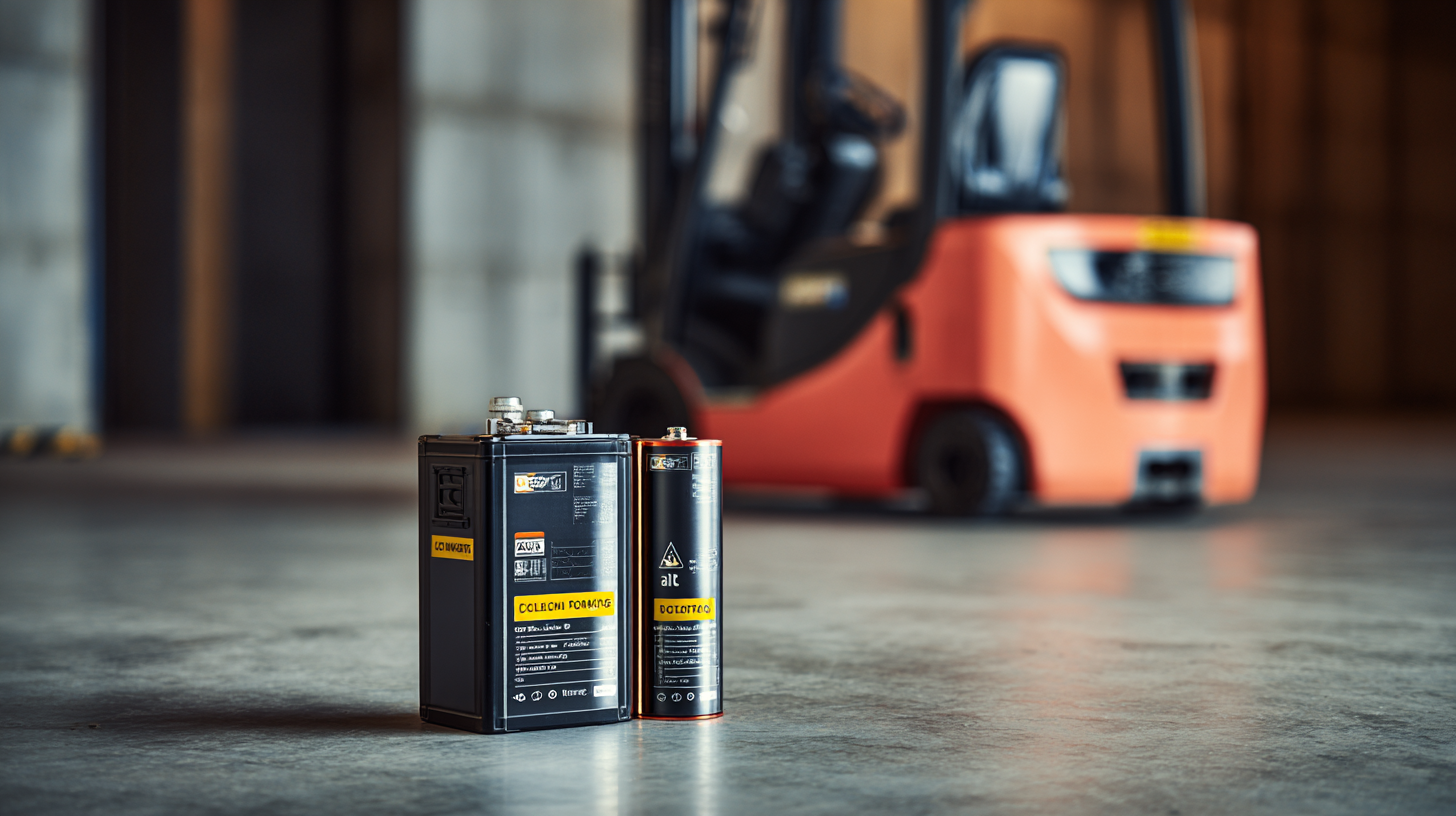- English
- Español
- Português
- русский
- Français
- 日本語
- Deutsch
- tiếng Việt
- Italiano
- Nederlands
- ภาษาไทย
- Polski
- 한국어
- Svenska
- magyar
- Malay
- বাংলা ভাষার
- Dansk
- Suomi
- हिन्दी
- Pilipino
- Türkçe
- Gaeilge
- العربية
- Indonesia
- Norsk
- تمل
- český
- ελληνικά
- український
- Javanese
- فارسی
- தமிழ்
- తెలుగు
- नेपाली
- Burmese
- български
- ລາວ
- Latine
- Қазақша
- Euskal
- Azərbaycan
- Slovenský jazyk
- Македонски
- Lietuvos
- Eesti Keel
- Română
- Slovenski
- मराठी
- Srpski језик

2025 Trends in Lithium Battery Technology: How to Innovate Your Forklift Fleet for Efficiency
As the logistics and materials handling industries evolve, the adoption of advanced technologies such as Forklift Lithium Battery systems is becoming increasingly crucial for enhancing operational efficiency. In 2025, innovative trends in lithium battery technology promise to revolutionize forklift fleets, enabling businesses to optimize their performance while reducing environmental impact. With a focus on "中国智造,全球热销,品质保证," this blog explores how these cutting-edge battery solutions can empower companies to innovate and modernize their forklift operations. By leveraging the latest advancements in battery technology, organizations can achieve significant improvements in energy efficiency, reduce downtime, and drive overall productivity. Join us as we delve into the transformative potential of Forklift Lithium Battery systems and the strategic opportunities they present for businesses looking to stay competitive in a rapidly changing marketplace.

Emerging Lithium Battery Technologies: A 2025 Overview for Forklift Fleets
As we approach 2025, the evolution of lithium battery technologies is set to reshape the landscape of forklift fleets. Emerging innovations in battery chemistry and design promise to enhance efficiency, extend operational hours, and reduce charging times. For instance, solid-state lithium batteries, which offer higher energy density and safety compared to traditional lithium-ion variants, are gaining traction in industrial applications. Forklift operators can expect to see vehicles equipped with these advanced batteries, resulting in longer-lasting power and fewer disruptions during peak operational demands.
Additionally, advancements in battery management systems (BMS) will play a crucial role in optimizing fleet performance. Intelligent BMS can monitor battery health in real-time, predicting maintenance needs and maximizing lifespan. This allows fleet managers to make data-driven decisions, leading to reduced operational costs. The integration of renewable energy sources with lithium battery systems is also on the rise, enabling fleets to operate more sustainably while lowering their carbon footprints. As we look ahead, these emerging technologies will undoubtedly provide a competitive edge for businesses willing to invest in upgrading their forklift fleets.

Comparative Analysis: Lithium-ion vs. Lead-Acid Batteries for Material Handling
The choice between lithium-ion and lead-acid batteries for material handling is crucial for optimizing forklift fleet efficiency. A recent report by the International Battery Association reveals that lithium-ion batteries have a significantly longer lifespan, lasting up to 5,000 cycles compared to only 1,200 cycles for lead-acid batteries. This translates into less frequent replacements, reducing both downtime and maintenance costs, which is essential for businesses striving for operational efficiency.
Moreover,  Lithium-ion batteries offer faster charging times, typically requiring just 1-2 hours to reach an 80% charge, while lead-acid batteries may take up to 8 hours for a full charge. In high-demand environments, this rapid charging capability means less waiting time and more productivity on the warehouse floor. According to a study from the Materials Handling Industry of America, companies can improve productivity by 15-20% when transitioning to lithium-ion solutions, providing a compelling argument for upgrading to this technology. With the growing trend towards electric solutions, the shift to lithium-ion is expected to accelerate, making it a pivotal innovation for the forklifting sector.
Lithium-ion batteries offer faster charging times, typically requiring just 1-2 hours to reach an 80% charge, while lead-acid batteries may take up to 8 hours for a full charge. In high-demand environments, this rapid charging capability means less waiting time and more productivity on the warehouse floor. According to a study from the Materials Handling Industry of America, companies can improve productivity by 15-20% when transitioning to lithium-ion solutions, providing a compelling argument for upgrading to this technology. With the growing trend towards electric solutions, the shift to lithium-ion is expected to accelerate, making it a pivotal innovation for the forklifting sector.
Exploring the Role of Fast Charging in Enhancing Forklift Efficiency
In 2025, fast charging technology is set to revolutionize forklift operations, significantly enhancing their efficiency within industrial settings. Current industry reports indicate that the adoption of fast charging solutions can reduce downtime by up to 50%, allowing forklifts to resume operations in a fraction of the time compared to traditional charging methods. This is essential in environments like warehouses and manufacturing plants, where every minute of operation counts towards productivity.
Moreover, recent studies show that integrating fast charging capabilities can lead to a 30% increase in forklift fleet utilization. By minimizing the time spent on charging, businesses can maximize their operational efficiency, effectively extending the work cycles of these essential machines. As companies look to innovate their forklift fleets, investing in advanced lithium battery technology that supports rapid energy replenishment becomes crucial. The ability to quickly charge forklifts not only boosts operational throughput but also aligns with sustainability goals by reducing the overall energy consumption per task completed.
Sustainability in Lithium Battery Production: Industry Standards and Innovations
Sustainability has become a central theme in the production of lithium batteries, particularly as industries shift towards greener technologies. Recent innovations in battery chemistry and manufacturing processes are setting new industry standards, significantly reducing the environmental impact associated with lithium extraction and processing. Initiatives such as closed-loop recycling systems and the use of ethically sourced materials are gaining traction, ensuring that the production of lithium batteries aligns with sustainable practices.
Moreover, advanced techniques such as solid-state battery technology are on the horizon, promising not only greater efficiency but also a decrease in hazardous waste. As companies in the forklift sector strive for efficiency, the integration of these sustainable practices is essential. Investing in innovative lithium battery solutions not only enhances performance but also positions companies as leaders in the transition towards environmentally responsible operations, ultimately contributing to a more sustainable future in material handling and beyond.
Future-Proofing Your Fleet: Integrating Smart Battery Management Systems
The future of forklift technology hinges on the integration of Smart Battery Management Systems (SBMS), which play a crucial role in enhancing efficiency and extending the life of lithium batteries. With the electric vehicle battery box market projected to grow from approximately $253.3 million in 2024 to an impressive $1.876 billion by 2032, representing a growth rate of 29.7%, it is evident that innovative solutions are in high demand within the logistics and warehousing sectors. These systems not only optimize battery performance but also help in monitoring energy consumption and predicting maintenance needs, crucial factors that can lead to significant cost savings.
As companies strive to future-proof their fleets, integrating SBMS into their operations presents both a technological advantage and a sustainability initiative. The ability of these systems to enhance charging efficiency and reduce downtime aligns perfectly with industry trends focused on operational excellence. Furthermore, as lithium battery technology continues to evolve, investing in smart management solutions will be essential for firms seeking to maintain a competitive edge in an increasingly demanding marketplace, where energy efficiency and reliability are paramount.
2025 Trends in Lithium Battery Technology: How to Innovate Your Forklift Fleet for Efficiency - Future-Proofing Your Fleet: Integrating Smart Battery Management Systems
| Trend | Description | Impact on Efficiency | Expected Adoption Rate by 2025 |
|---|---|---|---|
| Advanced Battery Chemistry | Incorporation of solid-state and lithium-sulfur batteries for higher energy density. | Improved runtime and reduced charging times for forklifts. | 30% |
| Smart Battery Management Systems (BMS) | Integration of AI-driven analytics for real-time battery health monitoring. | Enhanced lifecycle management and reduced operational costs. | 50% |
| Wireless Charging Solutions | Development of automated and inductive charging stations for forklifts. | Minimized downtime during charging periods. | 40% |
| Recycling and Second-Life Applications | Improving battery recycling processes and repurposing used batteries. | Sustainable practices and cost savings through reuse. | 35% |
| Electric Fleet Integration | Transitioning to electric forklifts with integrated battery solutions. | Reduction in fuel costs and lower emissions. | 60% |
